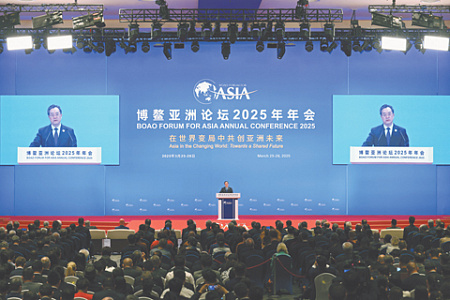
In China, a forum has opened in the city of Boao, which is called East Davos. It has been held annually since 2002 and serves as a tool to expand China’s influence in Asia. The motto of the meeting is: “Asia has a common destiny in a changing world.” The reality is that the participating states of the conference want to get more loans from China. And China, in turn, uses the meeting to advance its interests and weaken rivals.
Ding Xuexiang, Vice Premier of the People’s Republic of China and member of the Standing Committee of the Political Bureau of the CPC Central Committee, spoke at the opening ceremony of the forum. He said that significant progress has been made over the past decade in building an “Asian community” with a shared future. The speaker pointed to two developments: China and ASEAN have established a comprehensive strategic partnership; and the Comprehensive Strategic Partnership in the region has also entered into force. The speaker explained that due to the deepening of economic integration, Asia’s share in the global economy is steadily growing.
On the other hand, the factor of instability and uncertainty is increasing in the world. The solution, according to an influential party official, is to strengthen the “Asian community.”
Judging by the number of participants in the conference, it is really strengthening. More than 2,000 government officials, politicians, businessmen and experts attended the forum. Among the guests is the head of the Interim Government of Bangladesh, Muhammad Yunus. His presence gives the meeting a different color than it seems at first glance. After all, Yunus came to power as a result of a coup d’etat and student protests. Former Prime Minister Sheikh Hasina, who led the country for many years, was overthrown and flew to India. The Government of Bangladesh is demanding her extradition and trial. Delhi refuses to do this. Indian newspapers report on acts of violence taking place in the neighboring country and attacks on temples of Hindus, who represent a religious minority.
And Beijing, of course, is trying to present the forum in a favorable light for itself. Chinese Foreign Ministry spokesman Guo Jiakun welcomed the visit of Yunus, who will stay in China for four days. “China and Bangladesh are friends, neighbors, and they are bound by the bonds of a comprehensive strategic partnership. China is ready to step up contacts between citizens of the two countries and expand cooperation, especially given that 2025 marks the 50th anniversary of the establishment of diplomatic relations between Beijing and Dhaka,” he said.
Beijing also noted that Dhaka balances between different powers in its foreign policy and focuses on economic ties. However, Chinese commentators did not ignore the fact that Yunus’ visit caused a negative reaction in India. The Beijing-based Global Times newspaper writes that Indians perceive Yunus’ visit in a geopolitical, distorted way. After all, according to Qian Feng, director of the Department of Research at Tsinghua University in Beijing, the interim government of Bangladesh, which came to power in August last year, adhered to a policy of balance and did not want rapprochement with any major power.
As can be seen from the statements of Bangladesh officials, a number of memoranda of understanding may be signed with China during the visit. It is understood that agreements will be concluded on China’s assistance in training personnel, in combating natural disasters, on the creation of a library of Chinese classical literature, on cooperation in the field of information and sports. Agreements on China’s participation in the construction of the seaport are also possible.
The Chinese press recalls that Yunus had previously called on Beijing to relocate factories producing solar panels from China to Bangladesh, as well as to purchase more Bangladeshi goods. In other words, China has gained a firm supporter in the person of the current leader of Bangladesh. And in Delhi, they cannot watch this indifferently. China and India are rivals in the struggle for influence in South Asia. Their relationship is aggravated by a territorial dispute over the border in the Himalayas. So far, the line of actual control has been used instead. Of course, emotions are also making themselves felt here. After all, India, with the help of the Soviet Union, defeated Pakistan in 1971 and thereby ensured the victory of the national liberation movement in East Pakistan, in place of which Bangladesh arose.
This is not to say that now is not the time for Moscow to think about the events in Bangladesh. Russia is building a nuclear power plant in this country and is interested in stabilizing the situation. Russian Deputy Prime Minister Alexei Overchuk is participating in the Boao forum and will hold a meeting with Yunus.
In an interview with NG, Alexander Lukin, Scientific Director of the Institute of China and Modern Asia of the Russian Academy of Sciences, noted: “India, of course, is sensitive to the strengthening of China’s ties with countries that are civilizationally close to India. Indians can be understood. China is improving relations with countries such as Bangladesh, Nepal, and Sri Lanka, thereby challenging India as the dominant power in South Asia. And these countries believe that China can reduce their dependence on India. All this applies to the current head of the Government of Bangladesh. Being a pro-Western politician, he wants to take the country out from under the umbrella of India.”
